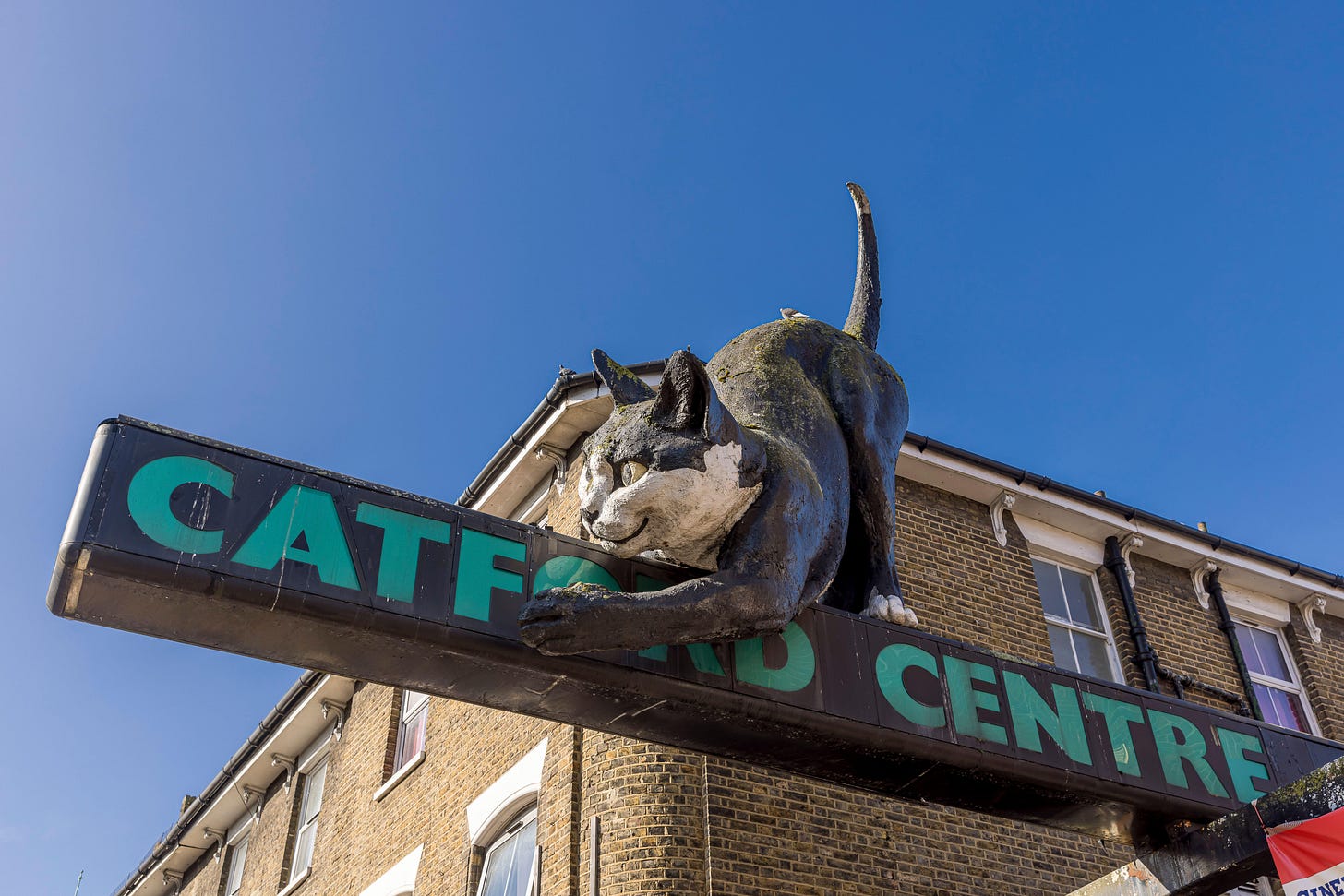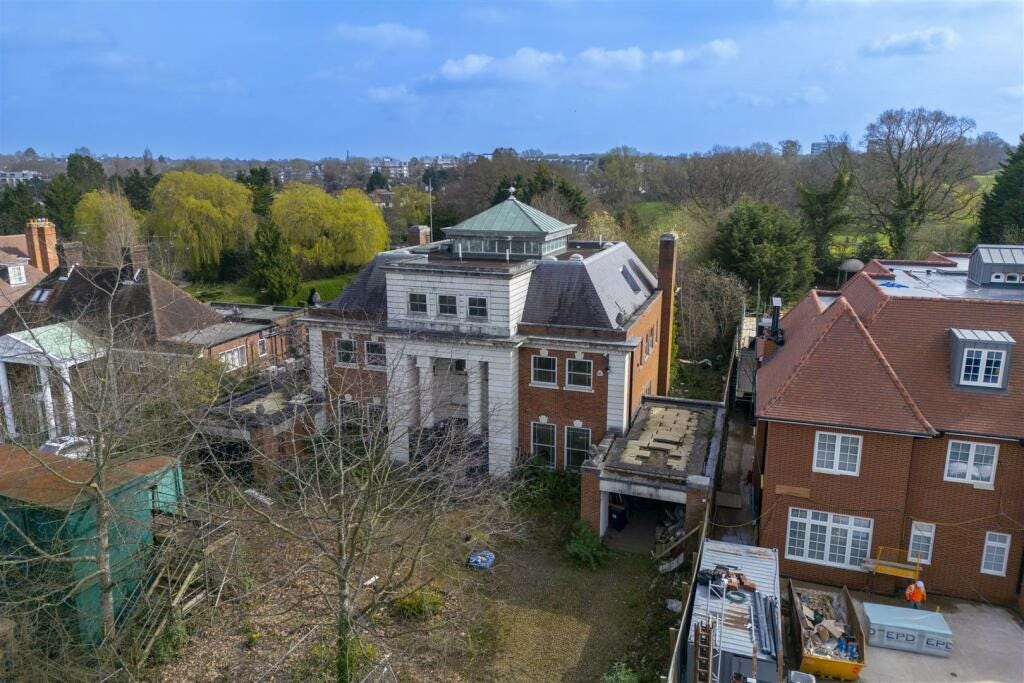“A disappointing budget for London”: When will the capital control its own money?
Plus: Is the sudden closure of a Catford cinema all that it seems — and who owns an abandoned mansion in Hampstead?
Welcome to London Centric, where it’s budget day but we’re not going to bombard you with graphs. Instead there’s just one question: What did London get?
One of the biggest issues with London is that it doesn’t have that much control over its own destiny. The capital’s finances depend, to an unusual degree when it comes to major global cities, on central government. The capital’s taxes largely go into a central pot and the mayor then has to ask for some of it to be handed back.
Now, for the first time in Sadiq Khan’s eight-and-a-half years at City Hall, he is negotiating with a national government formed from his own political party. London’s solid Labour vote helped deliver a large majority in the House of Commons. So where’s the capital’s payback?
Subscribers can scroll to the end to find out where the capital got money — or read on for a selection of non-budget stories.
Thank you to everyone who joined the mailing list after Marina Hyde recommended London Centric on the Rest is Entertainment podcast. (You can listen to her discussion with Richard Osman about the failing model of clickbait local news publishing from 18 minutes in.)
I’m very optimistic about the potential for a rebirth of pan-London journalism and have lots of exciting stories on the way — but London Centric will only be sustainable if people sign-up as paying subscribers to cover the costs of reporting, employing journalists, and dealing with lawyers. Your support is really appreciated.
What a cinema closing in Catford tells us about London’s arts scene.
Catford Mews, a cinema and arts venue squeezed into an old south east London 1960s shopping centre, announced its closure on Tuesday evening. Locals who loved using its facilities are bereft, describing how it had become one of the area’s main selling points by providing a mix of family-friendly entertainment, cultural events, and good food.
Many London Centric readers got in touch with messages of support for Catford Mews after news of its closure was broken by the Greenwich Wire. Musician Tom Herbert said it was a “a space for people to work, socialise, enjoy culture and also a welcoming sanctuary for some of Catford’s most vulnerable residents to stay warm and feel part of the community."
On the surface this is a story that will interest few people outside of a specific corner of London that has lost a community space. (Although hundreds of millions of people around the world have seen the cinema’s exterior as it provided the location of Ed Sheeran’s Bad Habits music video.) But London Centric dug a little deeper and uncovered a story about the strange relationship between the capital’s arts scene, property development, and public funding that stretches out across the city.
Catford Mews’ owners said they had been evicted by a regeneration company owned by Lewisham council, despite efforts to negotiate a new lease. The cinema used social media to ask its customers to email staff at the local authority to demand an immediate U-turn and a new deal to keep a local cultural asset open. The owners said the council had followed a "destructive path”, while insisting that Catford Mews had "never just been a commercial venture".
What’s clear, however, is that Catford Mews is very much part of a wider commercial venture. The cinema is ultimately owned by Really Local Group Ltd, a company run by ex-Deloitte property consultant Preston Benson that “creates and restores cultural infrastructure” on the UK’s high streets, usually by taking over leases on unloved properties and putting in small cinemas.
According to Lewisham council, Catford Mews hadn’t being paying its bills for several years and owed £650,000 in unpaid rent to the regeneration company owned by the local authority. Really Local Group also owned The Ealing Project in west London, a similar set-up in a shopping centre which went bust earlier this month with debts of nearly £2m. Peckham Levels, another arts and creative space run by Really Local Group in an old south London car park, also went bust in August leaving local artists tens of thousands of pounds out of pocket.
To lose one venue is a misfortune. But to lose three venues with combined debts of the millions of pounds in the space of just eight weeks might be considered a terrible run of luck.
In addition, although Really Local Group blamed Catford Mews’ debts on the legacy of the pandemic, it crowdfunded £500,000 from investors in 2022 on the basis that all of its venues, including Catford Mews, had “fully recovered” from the effects of Covid. This deal valued the overarching group at £21m.
Despite its woes Really Local Group has continued to open cultural venues across London, often winning very sincere praise from delighted locals who like what they bring to areas such as Sidcup. Councils appreciate the idea of regenerating an area by bringing in arts venues, while landlords want to attract people who might later be interested in buying flats in an area when a site is finally developed for houses.
Really Local Group’s latest venue, in Sutton, is another cinema operation that opened in August, backed by £1m of investment from the local council and £1.26m from central government’s high street renewal fund. Speaking two months ago, local Lib Dem council leader Barry Lewis said he was delighted to work alongside a cinema operator that had a strong track record with “successful projects in London such as Peckham Levels and Catford Mews”. After those Really Local Group projects failed, along with the cinema in Ealing, Lewis will be hoping it’s not fourth time unlucky.
Was Amy Lame’s tenure as Sadiq Khan’s night czar a disaster — or did she simply have no real power to revive the capital’s nightlife, as this excellent piece in The Quietus asks? It’s the conundrum at the heart of all coverage of London, a global city where the elected mayor has a fraction of the authority enjoyed by his equivalents in cities such as New York or Paris.
Cyberattack chaos continues.
BBC London kindly follow-up London Centric’s big investigation into the Transport for London cyberattack on Tuesday’s television and radio news. Since publishing that story we have been overwhelmed with messages from TfL staff sharing stories about the impact of the cyberattack and explaining how the public don’t realise the scale of the problems behind the scenes.
One major contractor that does a lot of work for TfL said the transport authority has been guessing the size of payouts to their company, potentially creating substantial liabilities, and work on ongoing maintenance had been severely disrupted. Other TfL staff had fresh horror stories about ageing internal software using to keep London running. But the really touching messages were from kind London Centric readers who offered to subsidise Melford, the teenager who was left unable to afford lunch thanks to cashflow issues brought on by the cyberattack.
Is there anything else we should investigate about the cyberattack? Please do get in touch, anonymity is guaranteed.
Preposterous London property of the week.
This ruined deeply bizarre mid-1990s mansion on The Bishops Avenue, the “billionaires’ row” of north London near Hampstead Heath, is on the market for £8.95m, albeit with the expectation it will be knocked down for redevelopment. The road is notorious for its rotting homes owned by absentee overseas owners who hide behind off-shore companies, as my former Guardian colleague Rob Booth examined back in 2014. But thanks to a positive transparency move introduced by the last government, anyone selling a property using such a structure now has to make a number of declarations.
As a result London Centric can reveal the building’s deeds are held by a company registered in the tax haven of the British Virgin Islands, which is in turn ultimately controlled by the “reclusive” Russian-born businessman Iouri Chliaifchtein and his wife Natalia. The couple have previously been named as owners of a nearby house on The Bishops Avenue where they were burgled for £2m worth of cash, cars and Cartier jewellery in 2006, before the property unfortunately burned down in mysterious circumstances. Iouri, who is usually described as a “financier”, has previously been involved in legal action over the quality of his private jet. He was last seen in court successfully suing over cuts to concierge services at his £18m Belgravia flat, which left him unable to summon his car and fearful for his security.
The big budget question: What did London get?
Speak to anyone involved in London politics and their demand is clear: The capital needs more control over how it spends its own taxes, urgently. The question is how much control central government is willing to give up over one of the biggest generators of income in the country.
Sadiq Khan, unlike fellow Labour politician and Greater Manchester mayor Andy Burnham, has largely avoided public criticism of Keir Starmer’s government since it was elected this summer. He was also publicly upbeat about Rachel Reeves’ budget, declaring that it showed the country finally has a government “that understands the problems and opportunities London faces and is working with us here in the capital, not against us.”
With the help of Daniel Reast, a researcher at the Centre for London think tank, London Centric sat down to pick apart what Reast considers “a bit of a disappointing budget for London”. This is where Reeves delivered for the capital — and where she didn’t.
Keep reading with a 7-day free trial
Subscribe to London Centric to keep reading this post and get 7 days of free access to the full post archives.





